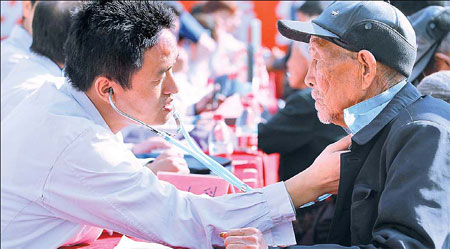|
For 230 million citizens getting ill means a time-consuming and expensive journey back to where their households are registered to get reimbursed for medical treatment. There is also a loss of income to factor in.
However, enjoying the convenience of being reimbursed where they work and live is a dream that may, actually, be getting a step closer to being realized.

Medical experts provide checkups for residents of new rural communities in Xuchang county, Henan province, as one of the services organized by the local government to boost the urbanization process. Niu Shupei / for China Daily
A new trial program for rural cooperative medical insurance could result in cross-provincial reimbursement of medical bills in nine areas: Jiangsu, Jilin, Anhui, Henan, Hubei, Hunan and Hainan provinces, the Inner Mongolia autonomous region and Beijing.
This means that rural villagers will be able to see doctors at any public hospital in these areas, and get their bills reimbursed.
But there is still a long way to go before fully cross-provincial or even cross-city medical bills are reimbursed at point of first contact.
Thanks to the different thresholds and percentages for reimbursement of medical bills in different provinces, it is, indeed, not easy for medical bills to be repaid when a patient's medical insurance account is in another area. But Internet technology means that as difficult as it is, it is not impossible.
The medical reform office under the State Council is trying to push for connectivity of all medical insurance accounts at a provincial level. When medical insurance accounts, that are mostly based in counties or cities, can be connected to a provincial platform, cross-city reimbursement of medical bills will be feasible within a province.
When this can be done within all provinces, autonomous regions and municipalities, it will be much easier for medical bills to be repaid on a cross-provincial level.
Yet underdeveloped regions fear that their medical insurance fund will be overspent when their locals seek, what they fear will be, expensive treatment in developed cities.
On top of this, their counterparts in more developed areas are concerned that their hospitals will be overcrowded.
Whatever constraints and difficulties there are, efforts need to be accelerated to first realize cross-city reimbursement of medical bills within provinces. Once problems are ironed out, the program can be upgraded to cross-provincial level.
Of course, efforts should also be made to realize the balanced distribution of medical resources by training doctors from underdeveloped regions and sending experienced doctors to underdeveloped regions on a rotating basis.
|